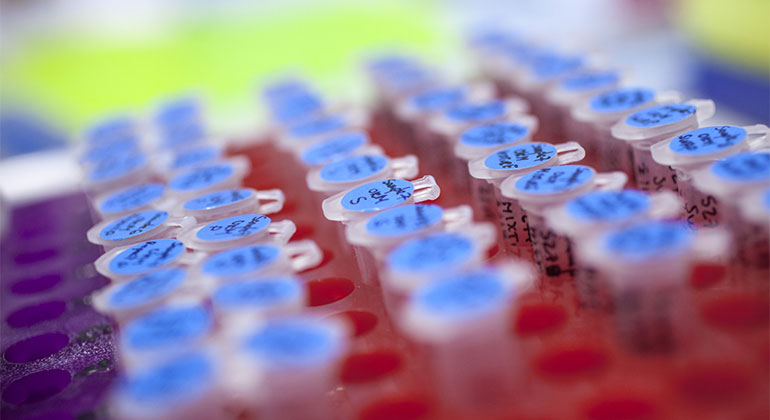Mount Sinai Researchers Report Encouraging Immunotherapy Option for Relapsed Myeloma Patients
T-cell redirection therapy effective in patients unresponsive to initial bispecific antibody treatment

Mount Sinai researchers have published results that show encouraging therapeutic options for patients with the blood cancer multiple myeloma after first-line treatment with bispecific antibodies fails. Bispecific antibodies are a type of antibody that can bind to two different antigens at the same time—they are meant to enhance the immune system’s destruction of tumor cells.
While new T cell-based immunotherapies, or “T-cell redirection” therapies, such as chimeric antigen receptor (CAR) T-cell therapy and bispecific antibodies have revolutionized cancer treatment, doctors still need to determine what second-line treatments (also known as salvage therapy) are effective after a patient relapses. In the August 26 online edition of Blood Advances, Mount Sinai researchers report that sequential use of different T-cell redirection therapies in these multiple myeloma patients is possible and could lead to good patient outcomes and survival.
In a retrospective analysis, researchers identified 58 multiple myeloma patients who participated in a bispecific antibodies clinical trial at Mount Sinai and underwent salvage therapy due to relapse. Patients were followed for an average of 30.5 months after the end of the trial and underwent an average of two salvage therapies over that period.
Nineteen patients received T-cell redirection therapy as a first salvage therapy, and the rest received a non-T-cell redirection therapy, such as chemotherapy. Thirty-two percent of patients who underwent T-cell redirection therapy as a first salvage therapy needed to undergo a second salvage therapy due to relapse or nonresponse to therapy. In a significant contrast, 79 percent of the patients treated with a non-T-cell redirection therapy needed to undergo a second salvage therapy. Some of this group of patients had T-cell redirection therapy as their second salvage therapy, resulting in a total of 28 patients who received T-cell redirection as either a first salvage therapy or second salvage therapy.
Depth and duration of response to the first bispecific antibodies treatment did not predict response to the second T-cell redirection therapy, indicating that even if patients did not respond to an initial T-cell redirection therapy, there may still be an option to effectively treat with a second course. The overall response rate of the 19 patients who transitioned from the initial bispecific antibodies to T-cell redirection therapy as a first salvage therapy was 84 percent, compared to 49 percent in those who received other types of therapies.
“As the clinical use and advancement of T-cell redirection therapies continue to grow, effective strategies are needed to manage outcomes for patients who relapse or are unresponsive to this initial treatment,” said senior author Samir Parekh, MD, Director of Translational Research in Myeloma, co-leader of the Cancer Clinical Investigation program at The Tisch Cancer Institute, and a member of the Icahn Genomics Institute at the Icahn School of Medicine at Mount Sinai. “This study shows patients relapsing after initial bispecific antibodies therapy can benefit from a second bispecific antibody or CAR-T cell therapy.”
Studies are underway to understand how T cells function after initial T-cell redirection therapy and how they are activated in sequential bispecific antibodies and CAR-T cell treatments. “Future clinical trials incorporating sequential combinations of T-cell redirection therapy will build upon these findings to further develop treatment guidelines and improve long-term outcomes for multiple myeloma patients,” Dr. Parekh said.
This work was supported by the National Cancer Institute (NCI) R01 CA244899 and CA252222.
About the Mount Sinai Health System
Mount Sinai Health System is one of the largest academic medical systems in the New York metro area, employing 48,000 people across its hospitals and more than 400 outpatient practices, as well as more than 600 research and clinical labs, a school of nursing, and a leading school of medicine and graduate education. Mount Sinai advances health for all people, everywhere, by taking on the most complex health care challenges of our time—discovering and applying new scientific learning and knowledge; developing safer, more effective treatments; educating the next generation of medical leaders and innovators; and supporting local communities by delivering high-quality care to all who need it.
Through the integration of its hospitals, labs, and schools, Mount Sinai offers comprehensive health care solutions from birth through geriatrics, leveraging innovative approaches such as artificial intelligence and informatics while keeping patients’ medical and emotional needs at the center of all treatment. The Health System includes approximately 9,000 primary and specialty care physicians and 11 free-standing joint-venture centers throughout the five boroughs of New York City, Westchester, Long Island, and Florida. Hospitals within the System are consistently ranked by Newsweek’s® “The World’s Best Smart Hospitals, Best in State Hospitals, World Best Hospitals and Best Specialty Hospitals” and by U.S. News & World Report's® “Best Hospitals” and “Best Children’s Hospitals.” The Mount Sinai Hospital is on the U.S. News & World Report® “Best Hospitals” Honor Roll for 2024-2025.
For more information, visit https://www.mountsinai.org or find Mount Sinai on Facebook, Twitter and YouTube.

Diabetes May Accelerate Blood Cancer Growth, Yet Survival Outcomes Differ by Race
Sep 29, 2023 View All Press Releases
